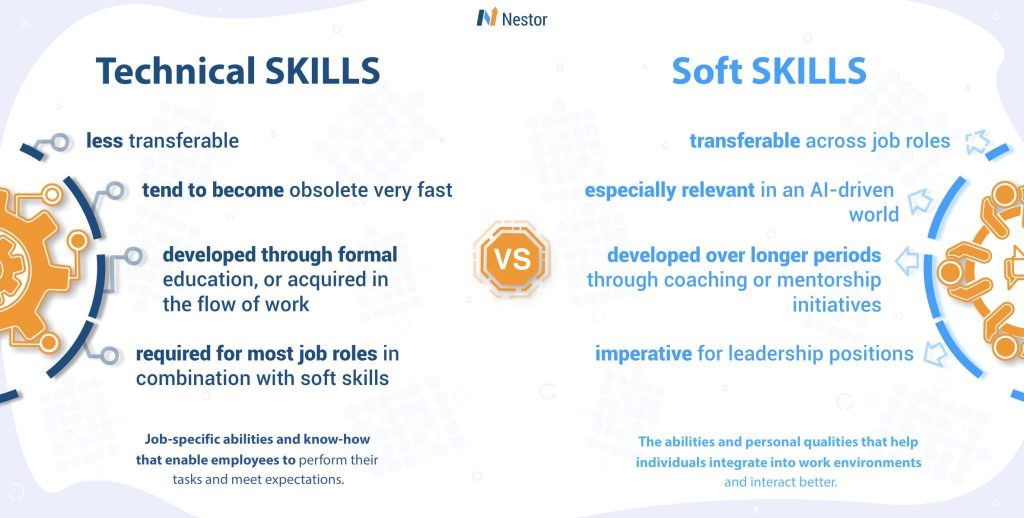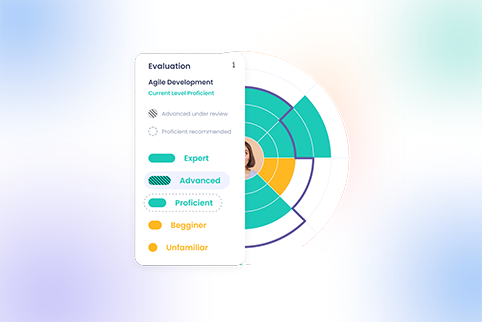Technical vs Soft Skills: Differences and Role in the Future of Work
8 min read

Our modern workplaces have gone through significant changes and have become more flexible, human-centric, and global than ever before. In these diverse and interconnected environments, skills have emerged as the driving force behind adaptability, resilience, and innovation — which inevitably leads to questions like: technical skills vs soft skills, what’s the difference between them? And which ones are more important?
Both employers and employees need to better understand these two categories of skills in order to start investing in actions that will keep them relevant and successful in the long run.
In this article, we explore the key differences between technical and soft skills and explain their roles and importance in the world of work. Let’s dive right in!
Technical skills vs soft skills: definitions
Let’s start by understanding what defines each skill category and how they serve modern-day employees and organizations:
What are technical skills?
Technical skills are specialized abilities and know-how, which enable employees to perform their core tasks and meet the performance requirements associated with a particular role in a given industry.
Thanks to technical skills, workers can effectively use specific techniques, machines, and tools to improve their work rates and automate routine tasks, which also plays a direct role in minimizing potential errors.
Usually, technical skills are acquired through formal education and training. However, they can also be developed through informal education, hands-on experiences, or even personal habits that are (more) technical in nature.
While technical skills are also referred to as hard skills, one should distinguish between them and digital skills — which are, in fact, a subcategory of the former.
Examples of technical skills
Some of the most in-demand hard skills in the current world of work are:
- programming and coding
- cloud computing
- cybersecurity
- data science
- machine learning and AI
- UI and UX design
- video editing
What are soft skills?
Soft skills are the abilities and personal qualities that help individuals integrate into various work environments and interact harmoniously with their peers and managers. These are the skills that make people great team players, excellent communicators, and capable to navigate a wide range of social situations in their work or personal life.
In essence, soft skills determine how a particular employee works, either individually or with others, and they become exponentially important as one progresses in their career and moves into managerial or leadership positions.
Soft skills are also known by other names, including human skills, power skills, essential skills, or people skills among others.
Learn more about the importance of soft skills.
Examples of soft skills
Nowadays, some of the most desirable soft skills are:
- leadership
- adaptability
- communication
- problem-solving
- critical thinking
- empathy
- networking

Technical skills vs soft skills: characteristics and differences
Having established the defining elements of each skill category, it’s now time to take a closer look at their essential traits and relevant differences:
Transferability
By their nature, hard skills are focused on a particular area or industry, which makes them less transferable. This is why people who want to make career changes or lateral moves often need thoughtful preparation, training, and support to adjust their skill set to the requirements of the new role.
Soft skills, on the other hand, are much more versatile and applicable across a wide range of roles or professional situations. This makes them valuable and desirable for both employees and employers and can lead to more dynamic and fulfilling career paths. Fulfilled employees are engaged employees, which will also reflect in lower attrition rates for HR departments.
L&D
Technical skills are usually acquired through traditional education, professional training, or learning in the flow of work. They are less likely (although not impossible) to be developed through personal or leisure activities.
This does not apply to human skills, which are often either innate abilities or related to personal behaviors and attitudes defining each unique individual. While soft skills can be developed over time, they require a more human or personal approach and often benefit from coaching or mentorship initiatives.
Tracking and measurement
Organizations can easily and objectively define, measure, and track the hard skills of their workforce through various methods, including previous work, assignments, self-assessment, skill assessments, performance evaluations, etc.
Evaluating soft skills is more subjective, and often relies on perceptions or input based on interactions and interpersonal dynamics at work. Peer feedback and 360-degree surveys are great tools in that direction. During the hiring process, behavioral interview questions and the overall image of how the candidate presents themselves can also be good indicators of their human skills.
Certification
Depending on the industry or local regulations, some hard skills can only be used in a professional environment after being validated by specific institutions or boards. This is especially the case for engineers, architects, lawyers, doctors, and others.
Human skills, on the other hand, aren’t usually backed by certificates. Instead, they can be revealed by activities unrelated to work, such as a candidate’s volunteering efforts, side hustles, or career choices.
Still, it’s not uncommon to encounter certifications that target soft skills, including leadership, corporate communication, team working, and so on.
Relevance
Due to the rapid pace of technological advancements, technical skills need to be updated regularly or even replaced when they become obsolete. That’s why internal upskilling and reskilling initiatives are increasingly important and necessary.
The opposite is true for soft skills, which aren’t negatively impacted by the new AI-driven world we’re entering or by the Fourth Industrial Revolution. In fact, as automation and robots replace simple tasks and roles, soft skills will become the key asset that will allow future members of the workforce to remain relevant and provide value by solving more complex challenges.
Technical skills vs soft skills: importance in the modern workplace
For most job roles, a combination of hard and soft skills is required — the proportion will vary, of course. But in an ideal world, the best-fit candidate should have a comprehensive skill set, which includes both technical and interpersonal abilities.
However, many organizations and HR recruiters are more inclined to select someone with strong or proven soft skills over a candidate whose main strength is represented by hard skills. Why? Because soft skills, being related to personal behaviors and traits, are more difficult to develop or change over time.
The complementary nature of technical and soft skills is also supported by insights from LinkedIn’s Workplace Learning Report, which reveals that:
4 out of the top 10 skills companies need the most are human skills: management, communication, leadership, and teamwork.
The growing importance of human skills is also fueled by external events, like the pandemic, which has seen businesses shift to fully remote or hybrid work. In these environments, where face-to-face interactions aren’t an option, soft skills like communication and empathy become essential in maintaining positive interactions and a supportive atmosphere.
Organizations that are shifting (or at least considering) agile approaches will also value soft skills more than hard ones, since these act as a foundation for internal mobility programs and the development of a more resilient and adaptable workforce.
Why soft skills are considered the skills of the future
There are two main reasons why human skills are expected to become critical in the (near) future:
- automation, robots, and AI will make (some) technical skills less relevant over time
- soft skills aren’t likely to become obsolete any time soon and cannot be replicated by machine learning or intelligent algorithms, at least for now
While it’s easy to talk about the inevitable disappearance of jobs, we should instead focus on the new types of jobs that will rise thanks to the AI revolution.
For most of these roles, candidates will need more well-rounded soft skills that enable them to solve complex problems and provide the critical human touch, which is necessary in many areas, such as healthcare, sales, marketing, etc.
Final thoughts
So, technical skills vs soft skills — which deserves more attention? Although technical abilities will remain important, the spotlight is quickly shifting toward soft skills in the realm of employment.
As AI and robots evolve from mere tools into cooperative partners, both businesses and ambitious individuals must emphasize nurturing these essential abilities. This strategic focus will guarantee a strong foundation, enabling them to remain relevant and successful regardless of what the future of work might bring.







